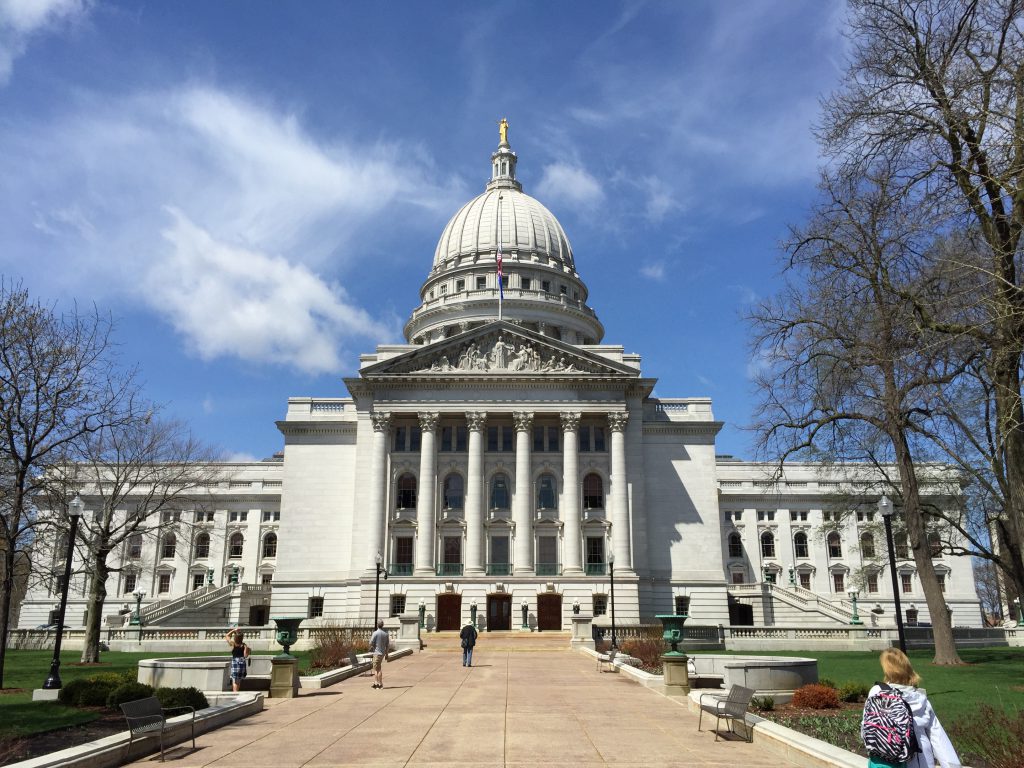Why to Vote No on Marsy’s Law
Referendum proposal would undermine due process and the presumption of innocence.
The television ads urging support for Marsy’s Law to grant equal rights to crime victims may sound reasonable. But a careful review of Marsy’s Law and the grave damage that enacting it could do to every accused citizen’s Constitutional rights is anything but reasonable – it is dangerous.
The innocuously worded and misleading one-sentence question on the April ballot regarding amending Wisconsin’s Constitution to give “additional rights” to crime victims deserves a “no” vote for many reasons.
Marsy’s Law is a flawed attempt, led by a California billionaire, to amend Wisconsin’s Constitution in significant ways. Adopting Marsy’s Law would do tremendous damage to our foundational Constitutional principles of justice – namely, the presumption of innocence and due process.
Do not be misled by the claim that federal constitutional rights of the accused will remain intact under Marsy’s Law. The broad, additional Constitutional rights Marsy’s Law would give to accusers would, in many cases, directly conflict with the Constitutional rights of the accused.
No reasonable person would disagree with some provisions of Marsy’s Law. For example, of course victims should be treated with dignity, respect, courtesy, sensitivity and fairness. But you do not get to vote only on the reasonable provisions of Marsy’s law – if you vote to adopt it, you get the whole thing.
Perhaps most troubling is that a “victim” under Marsy’s Law could refuse to provide discovery (evidence) to an accused person, depriving the accused of potentially relevant and exculpatory evidence that goes to his or her innocence. Marsy’s Law would afford a “victim” the Constitutional right to “refuse an interview, deposition, or other discovery request made by the accused or any person acting on behalf of the accused.”
Other states have adopted Marsy’s Law, and some have experienced enormous problems after the law was enacted.
In South Dakota, Marsy’s Law overwhelmed and put such an unworkable burden on law enforcement and prosecutors that the law had to be amended just two years after enacting it. Implementing Marsy’s Law’s unfunded mandates also added hundreds of thousands of dollars in unexpected costs to counties in South Dakota.
In Montana, voters passed Marsy’s Law in 2016, but the Montana Supreme Court later struck down the law in its entirety, finding that the many provisions of Marsy’s Law should have been submitted to voters separately because forcing persons to vote ‘yes’ or ‘no’ on all of the provisions in their entirety meant that voters had “no way to express their opinions as to each proposed constitutional change.”
States such as New Hampshire have previously rejected Marsy’s Law, with many people recognizing the threat it poses to the due process rights of our citizens and to the presumption of innocence.
Many victims’ rights advocates have expressed strong opposition to Marsy’s Law. In Iowa, for example, the Executive Directors of the Iowa Coalition Against Domestic Violence and the Iowa Coalition Against Sexual Assault strongly opposed Marsy’s Law. In a 2018 column titled “We’re Victims’ Rights Advocates, and We Opposed Marsy’s Law,” the victims’ rights advocates wrote, “[t]he assertion that victims deserve constitutional rights equal to the accused mischaracterizes how the justice system operates” and Marsy’s Law “threatens due process and diminishes fundamental principles of American justice.” The victims rights’ advocates wrote succinctly, “The accused have constitutional rights because getting it wrong means we imprison innocent people and an offender remains free to harm others.”
Many of the provisions of Marsy’s Law are largely already provided to victims in Wisconsin by long-standing state statutes or by our Constitution itself. Chapter 950 of the Wisconsin Statutes, often referred to as the “Victims’ Rights” law, already provides victims with dignity, respect and a plethora of rights while upholding the Constitutional rights of persons accused of crimes.
Adopting Marsy’s Law and amending Wisconsin’s Constitution would pose enormous threats to the rights of every person accused of a crime in this state and chip away at the fundamental principles of due process and the presumption of innocence. Do not be misled by the ads running on television in support of Marsy’s Law. Please vote ‘No’ on this dangerous proposal.
This column was first published by the Sheboygan Press.
Casey Hoff is a criminal defense attorney based in Sheboygan.
Op-Ed
-
Unlocking Milwaukee’s Potential Through Smart Zoning Reform
 Jul 5th, 2024 by Ariam Kesete
Jul 5th, 2024 by Ariam Kesete
-
We Energies’ Natural Gas Plans Are A Mistake
 Jun 28th, 2024 by John Imes
Jun 28th, 2024 by John Imes
-
Milwaukee Needs New Kind of School Board
 Jun 26th, 2024 by Jordan Morales
Jun 26th, 2024 by Jordan Morales





















